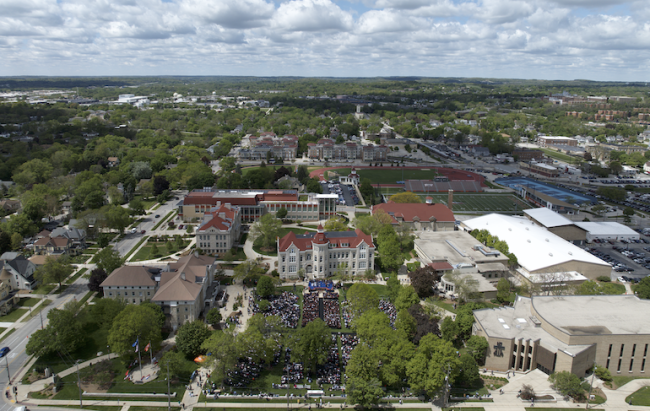You have /5 articles left.
Sign up for a free account or log in.

Carroll University in Wisconsin will offer mental health services to community members for the second consecutive summer.
Josh Hughes / Carroll University
Even during the summer months, mental health professionals at Carroll University, a private Wisconsin institution, are still hard at work offering their services—just not (solely) to students. For the second year in a row, the university will operate a 15-week free mental health clinic, called the Community Counseling Center (CCC), targeted at members of the larger Waukesha community, including students as well as those unaffiliated with the university.
Faculty and students in Carroll’s relatively new behavioral health psychology master’s program, which accepted its first cohort in 2021, provide therapy to community members through the center, which charges no fees and does not require clients to have insurance.
“Servicing the community in this way is not only aligned with our program, but it really aligns with Carroll University’s values,” said Jessica Lahner, director of the behavioral health psychology master’s program.
The clinic was created in response to a shortage of mental health professionals in Wisconsin and throughout the country, a problem that many universities have sought to help tackle. Often those efforts have centered on launching new behavioral health and clinical psychology programs; Carroll’s program, for instance, is hybrid in order to make it as accessible as possible to students.
But it’s rarer for a university’s counseling center to offer services directly to underserved community members. Marcus Hotaling, director of the Association for University and College Counseling Center Directors, said he hadn’t previously heard of a university offering such services over the summer.
“I think it is a great idea—it allows people to access care, as well as for clinicians to work with people with different needs and struggles than college students,” he said in an email to Inside Higher Ed. He noted that the therapists would need to carry their own malpractice insurance, which could be a barrier for colleges interested in implementing a similar program.
Lahner said Carroll covers all of the program’s costs, including paying for the clinicians’ insurance. The CCC is housed at the Waukesha Free Clinic, an independently operated resource on Waukesha’s campus that offers other health services to residents of the county year-round.
Growing Year by Year
In its first year, the CCC scheduled 140 appointments, but the clinic has added more staff and expanded evening appointments this year, increasing the clinic’s capacity to allow about 20 appointments a week.
“Last year, we were hesitant to market widely because we wanted to be sure that we could service the folks that came our way,” Lahner said. This year, “we feel confident in our capacity to serve clients; we feel confident in our referral system. We know because we are a short-term clinic that we’re going to probably, at the end of summer, need to refer many of our clients for continued care, and this summer, we feel confident that we have a really strong and robust referral network.”
She said she hopes the university will eventually be able to offer community counseling services year-round, though it will depend on the center’s ability to secure external funding.
The CCC has built strong relationships with local crisis organizations, such as The Women’s Center, a nonprofit in Waukesha County combatting domestic abuse that refers clients to the center for temporary treatment, as well as area clinicians who can take on the CCC’s clients once the center closes for the academic year.
“They took action and they’re doing the best that they can to meet the needs within our community … it’s very refreshing that a community partner took the initiative to make that change,” said Krystal Chase, director of advocacy and support services at The Women’s Center.
The summer clinic is a win-win for both the community, where it has quickly become a valued resource, and the students in the program, who are gaining hands-on training by working in the clinic.
Rocio Cerrillo, who is graduating this summer from the behavioral health psychology master’s program and is currently working at the clinic, said that she has served in numerous clinical settings, before and during her program at Carroll. But this is the most diverse clinical setting she has worked in; right now, for example, she is working with older clients for the first time, after mostly working with young people in previous roles and internships.
“One of the beautiful things is we get to see such a wide variety of folks because we don’t require insurance,” she said.
Cerrillo, who also earned her bachelor’s at Carroll, said she hopes to continue working with the CCC in some capacity even after she graduates in August.




